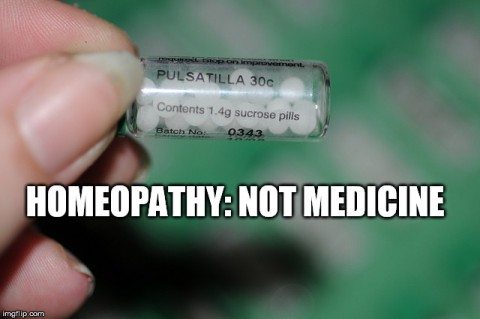
The battle to rid modern scientific societies from the blatant and harmful pseudoscience of homeopathy continues. This past year has been overall a good one – in the US both the FDA and FTC decided to review their regulation of homeopathy. They have gathered their testimony and are now apparently reviewing everything. Their decisions on this topic are eagerly anticipated and could decide the fate of homeopathy for the next one or more generations.
Some success
In the UK the situation is also very positive. Their national health service is considering blacklisting homeopathy so that general practitioners cannot prescribe homeopathic products.
Success in the UK is largely due to The Good Thinking Society, founded by Simon Singh. They have been tirelessly campaigning against NHS coverage of homeopathy and are making steady progress. They are demonstrating that skeptical activism can be effective.
Likewise, SBM and the Society for SBM are having an impact in the US, mainly through persistent persuasive writing and being available as a resource to politicians, the press, and regulators. Members have personally consulted with the FDA, FTC, and staff of senators interested in the issue.
Overall we seem to be building momentum against homeopathy, but this backlash is primarily fueled by scientific evidence. I recall 20 years ago, when the push to research so-called alternative medicine was really starting. My attitude at the time was that it would all be a monumental waste of resources and serve only to promote CAM, but at the same time proponents should be careful what they wish for. Rigorous research into magical treatments that don’t work is extremely likely to have one outcome, and that is exactly what happened.
The picture is more complex as there is a great deal of not-so-rigorous research muddying the waters. Scientists, however, know how to look at a large body of research and discern what it says.
In the case of homeopathy, whenever objective scientific bodies look at the totality of research into homeopathy, they all come to the same conclusion – it does not work. Most recently, the Australian Government National Health and Medical Research Council reviewed the evidence and concluded:
The available evidence is not compelling and fails to demonstrate that homeopathy is an effective treatment for any of the reported clinical conditions in humans.
Consumer Reports has even reviewed the evidence and concluded that homeopathic products do not work and their labeling and placement in pharmacies can cause consumer confusion.
Response of homeopaths
Homeopaths, of course, are not taking this lying down. Their responses, however, are very telling, and betray their intellectual dishonesty. For example, Dr. Helen Beaumont, a UK GP and the president of the Faculty of Homeopathy, told the BBC:
Patient choice is important; homeopathy works, it’s widely used by doctors in Europe, and patients who are treated by homeopathy are really convinced of its benefits, as am I.
This is typical – an appeal to popularity, a naked assertion that it works despite the negative evidence, an appeal to freedom of choice, and an appeal to personal belief. It is difficult to pack more logical fallacies into one brief statement.
They defend their assertions, when they choose to reference research at all, by cherry picking:
In an email to Consumer Reports, Alissa Gould, a spokeswoman for the American Association of Homeopathic Pharmacists, cites a “significant body of evidence that supports the effectiveness of homeopathy,” including a large 2011 report by German researchers.
There is no “significant body of evidence” that supports homeopathy. There is a significant body of evidence that shows it does not work. In order to come to the opposite conclusion you have to ignore systematic reviews, ignore scientific rigor, ignore common sense even, and select only the poorly done studies that support your bias.
Conclusion: Homeopathy cannot work and does not work
The science regarding homeopathy is absolutely clear – it cannot work and it does not work. Homeopathic products are nothing but expensive placebos. Yet consumers continue to spend billions of dollars on these worthless products, threatening their health.
The only rational response is for regulation to properly reflect this science. The FTC should not allow homeopathic products to make unsupported medical claims. The FDA should do their job and regulate homeopathy as drugs, since they are classified as drugs. All they have to do is require evidence of efficacy, and the US homeopathic market would evaporate.
The UK should ban the prescription of homeopathic products and close remaining homeopathic hospitals. Other countries as well should remove any government support for homeopathy, and properly regulate their marketing.
Anything less is malfeasance. It is an injustice to consumers, and an affront to science and basic common sense.
Homeopaths can go down kicking and screaming, but they are on the wrong side of science, and hopefully soon will be on the wrong side of history.

